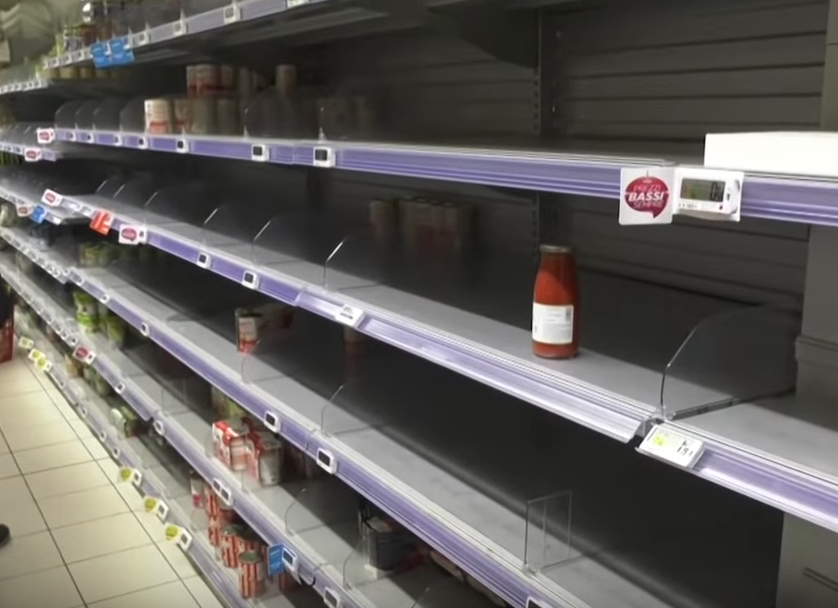
By now, we're all well aware of the toilet paper shortage that's happening in many grocery stores across the country. If you haven't seen the empty aisles for yourself, then you've certainly read the headlines or seen countless memes about Americans suddenly panic-buying paper goods before heading into self-isolation. But on Facebook, many parents have expressed fear over another shortage shoppers may soon face — one that could have far more repercussions than merely running out of TP too early. In many stores, parents report that infant formula, diapers, and other baby care essentials are suddenly running low, and it has left them understandably panicked.
There's no actual data yet to confirm whether there's an actual shortage on these items, according to the San Francisco Chronicle.
In fact, the newspaper reported that supply chain experts have noted most hot-commodity items right now are able to be restocked fairly quickly. (Aside from hand sanitizer, which has become "exceedingly hard to come by," according to the New York Times.)
Still, it's hard to ignore the many social media posts that have been popping up in the last few days.
“I’m so disheartened to hear about people going to buy diapers and wipes, or formula and can’t find any,” Delaney Scantlebury wrote in a local mothers Facebook group, according to the Chronicle. “People, stop hoarding.”
“Went to Target to get a pack of wipes and this aisle is completely empty,” another member, Amber San Miguel, wrote.
For donation centers, which rely on the goodwill of others to replenish their supply of baby care items, the shortage is very real.
As people continue to hoard items for themselves and their own families, donations of many basic items have dipped.
Just ask the volunteers at the Homeless Prenatal Program, where low-income families asking for infant formula have been told that it’s out of stock.
“This can be devastating for families who rely on us,” Martha Ryan, executive director of the program, told the Chronicle. “It’s shocking to me, we’ve never had a shortage before.”
When you consider that food banks served an estimated 46 million Americans in 2015, having a sudden shortage of donations amid a national crisis is certainly concerning. For families who may have no alternative source of nourishment for their babies, that's especially worrisome.
Ryan told the Chronicle that the reduction in donations directly correlated with the news of the spreading coronavirus last week.
At the same time, news of people hoarding stockpiles of toilet paper and other essentials began to sweep the internet. So did heartbreaking tales of elderly Americans being forced to go to multiple stores for basic essentials.
All at once, a dark, every-man-for-himself-like picture emerged.
During a press conference on Monday, even President Trump tried to urge Americans to curb all the panic-buying.
“You don’t have to buy so much,” Trump assured. “Take it easy. Just relax."
Whether or not Americans will heed that warning remains to be seen. In the meantime, both low-income parents and donation centers are bracing for the worst.
“It’s unfortunate because there’s no substitute for formula,” Serena Meyer, a lactation consultant in Oakland, told the Chronicle. “I’ve heard that people are thinking about inducing breast milk production, but that’s not for everybody."
Changing a baby's feeding patterns — whether you're switching from formula to breast milk or breast milk to formula — is something that should happen gradually, over a period of time, to avoid any discomfort or digestive issues. But aside from that, a mother who has been formula feeding for some time simply cannot produce breast milk overnight.
The US isn't the only nation facing potential shortages, particularly on baby formula.
So is the UK — where a heartbreaking coronavirus hoax was just revealed.
Just as supermarket shelves were starting to run low on the baby essential, viral posts were beginning to make their way around Facebook, claiming that parents in need could simply call formula companies or dial 111 to request free formula, according to Yahoo News.
The nation's National Health Service has since confirmed that those claims — many of which were shared on the popular Facebook page The Motherload — were false.
"There has been an explosion of false viral posts over the last 24 hours about how to obtain baby formula in a crisis, due to low levels in store as a result of panic buying," Motherload founder Kate Dyson told Yahoo News UK. “Unsure as to the validity of these claims, our moderation team took some time to speak to both formula companies and NHS 111 to confirm that this is false information being given to parents."
It is unclear just how many parents tried to obtain the free formula after fearing their supply would run out and they'd be unable to purchase more.
In light of the crisis, US milk banks have been urging breastfeeding moms to donate extra breast milk if they can.
However, there is understandably some hesitancy to do so.
COVID-19 has not been detected in breast milk, but there's also just not enough data yet to know for sure if mothers with the virus can transmit it through their breast milk, according to the Centers for Disease Control and Prevention. The virus, which only began spreading in Wuhan, China, back in December, is still very new — and with that comes a lot of unknowns.
Still, donation centers such as The Milk Bank, which distribute donated breast milk to hospitals and families in need throughout the nation, are asking for more. It's a particularly important thing to have because donated breast milk is often used in NICUs whenever a birth mother's milk is compromised or unavailable.
As the virus continues to spread, the need for these donations could skyrocket even more.
"The breast milk from the bank is available for [NICU babies] instead of the formula because formula is harder for their system to digest," Lauren Higdon, a Lexington doula and director of Centered Lexington, told the Chronicle.
As diapers have also been flying off shelves, some on social media have also suggested the benefits of cloth diapering.
Still, having access to cloth diapers while on quarantine — or, quite frankly, having the means to keep up with all of the washing that would entail — is not an option for everyone.
As panic continues to mount over just how long US residents will be advised to stay indoors, it's also increasingly difficult to convince them to buy less, not more.
The rush for basic essentials has also led many to buy up supplies and resell them for a profit online.
Although some may see this move as merely "enterprising," others are calling it out for what it really is: selfish and (potentially) dangerous.
"This is getting insane and stupid," wrote Facebook user Kristina Ingerson on March 14. "Diapers, wipes, and formula are being resold on marketplace. Not only that but local Moms are telling me they have been seeing moms break down in tears because the 5th store they have been to is out of diapers, wipes, and FORMULA. Let that shit sink in … a mother is unable to FEED her infant because everyone is going insane or being jerks and reselling above market value OR stocking up for… what? The apocalypse? The movie Contagion becoming a reality? Your stock pile puts others out of stock. People who just want to do their normal weekly shopping — can't."
"Be prepared, but don't be a d–k," she added.
(Wise words, if ever there were.)
On Monday, Trump urged all Americans to limit gatherings to no more than 10 people at a time for the next 15 days.
(And even then, those gatherings should only happen if necessary.)
During a press conference Tuesday, he once again reiterated that decree, adding that he is also proposing an expansive stimulus package, which would include loans for small businesses, flexibility for fast-food workers, and potentially put relief checks in Americans' hands within the next two weeks.
“If we do this right, our country — and the world frankly — but our country can be rolling again pretty quickly, pretty quickly," Trump said. "We have to fight that invisible enemy that I guess is unknown but we’re getting to know it a lot better."




